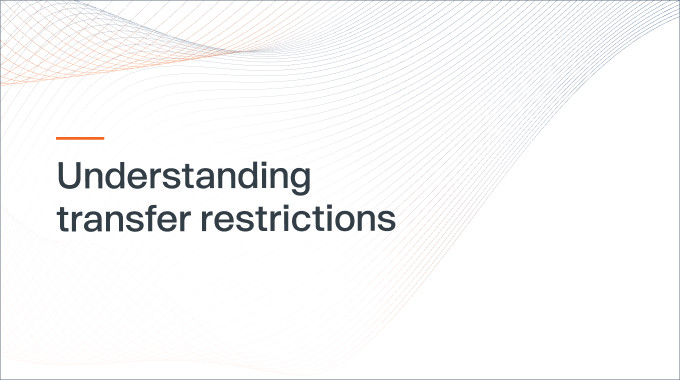What happens when a company exercises its right of first refusal (ROFR)?
In the private market, where access to shares can vary and the opportunity to transact them can be limited, the right of first refusal (ROFR) is an important, but frequently misunderstood, secondary market consideration. Investors looking to buy or sell shares in private companies may experience delays or potential deal cancellations when ROFR provisions are exercised, which is why it’s essential to know how they function.
Understanding a right of first refusal (ROFR)
A right of first refusal (ROFR) is a provision that grants a private company (or its existing shareholders or investors) the right to match a third-party offer before any shares are sold. This right typically needs to be exercised within a specific time frame, which can extend the time it takes to complete any transaction.
ROFR provisions are often included in a company’s bylaws, shareholder agreements, or equity award agreements, and specify who and how the ROFR can be exercised. In most cases, a company and/or significant shareholders hold the ROFR.
A ROFR and the transaction process
A ROFR provision is activated when a shareholder is presented with an offer to buy their shares. The procedure generally consists of the following steps:
- Sale offer: A shareholder is approached by a third-party buyer who wants to buy their shares. Once both parties agree on terms, the shareholder then notifies the company about the potential transaction. If a shareholder also holds a ROFR, the company will typically notify the shareholder on behalf of the seller.
- Exercise of ROFR: Then, if applicable, the company or eligible shareholder has a specific time frame, typically 30-60 days, to decide whether to exercise their ROFR and buy the shares instead of the shares being transacted externally.
- Decision to exercise or waive ROFR: If the company or shareholder chooses to exercise their ROFR, they will purchase the shares on the same terms as the offer presented by the third-party buyer. If they decline, the selling shareholder is free to sell their shares to the third-party buyer on the proposed terms.
- Timing of sales: The timing and duration of private share transactions can be impacted by the existence of a ROFR provision. The ROFR exercise period could lead to a delay that might extend the transaction process; particularly if there are multiple parties involved in exercising the ROFR.
Why do companies and stockholders use ROFRs?
Private companies use ROFR provisions as tools to retain control by allowing the company to match any offer made by an external, third-party for existing shares; thus, preventing the shares from ending up in the possession of unwanted investors, such as competitors or unknown entities.
This is particularly crucial during critical times like fundraising, acquisitions, or IPO preparation. To this end, ROFRs act as an important form of protection, allowing companies to maintain internal cohesion and a steady ownership structure, while also providing a degree of flexibility for early investors seeking to sell their shares.
Shareholders may choose to exercise a ROFR to maintain or increase their ownership stake in a private company—both to preserve economic value and to retain, or expand, their voting control. A ROFR gives existing investors the opportunity to purchase shares before they are sold to an outside party, which can be a strategic move in closely held companies where influence over governance and future decisions is highly valuable.
In addition, shareholders may view the ROFR as a chance to acquire more equity at an attractive price. If they believe the company’s shares are undervalued in the proposed transaction, exercising their ROFR could potentially allow them to purchase the stock at a discount to its perceived intrinsic value. In this way, a ROFR can serve not only as a tool for protecting existing interests but also as a means of capitalizing on inefficiencies in the private market.
Implications for transactions in the private market
The exercise of a ROFR has various implications for private market transactions:
- Control and flexibility: When a ROFR is exercised, a company can retain control over its shareholder base by restricting the sale of shares to outside purchasers. This is especially important in more closely held companies that aim to keep strategic control.
- Maintain or increase ownership stake and voting power: As noted above, a shareholder may want to exercise a ROFR to preserve his or her economic value and to retain, or expand, voting power. In such an instance, the implication would be that the proposed transaction does not proceed.
- Timing considerations: Utilizing the ROFR can potentially cause delays in transactions. Potential buyers might have to wait until the ROFR exercise period is over before they can buy shares, and this delay could impact market dynamics and how easily the shares are perceived to be bought and sold.
- Investor strategy: Private market investors should, ideally, comprehend the full terms of any applicable ROFR provisions, as it can directly impact their ability to transact shares.
The bottom line
In the evolving private market landscape, understanding mechanisms like the ROFR is critical for investors and shareholders aiming to navigate transactions with confidence. While ROFR provisions serve as valuable tools for companies seeking to maintain control over their ownership structure or for existing shareholders to increase their ownership stakes, they also introduce a layer of complexity that can affect timing and deal certainty. For both buyers and sellers, being well-versed in how ROFRs function—and how they can shape outcomes—is key to making informed, strategic decisions in secondary transactions. As the private market continues to mature, knowledge of these provisions isn't just an advantage—it's a necessity.



